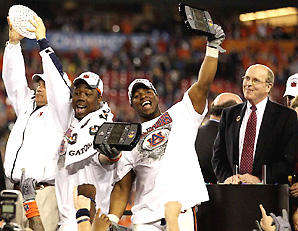
Parting thoughts on two men who loomed large over this season
Two-and-a-half days, it turned out. "This decision was difficult for me and my family," said the Heisman winner on Thursday. And yet, they didn't anguish over it for long, did they?
I'll miss Newton, who played with incredible passion and joie de vivre. (You'd think at least some of that might've rubbed off on Gene Chizik. Oh well.) I admired the robust bond he cultivated between himself and Tiger Nation -- the blown kisses, the towel-waving, the postgame forays into the stands. Calculated or not, it was smart. No matter what the national media had to say about Newton and his father, Auburn partisans had his back.
This is clearly a bright kid; he mastered Gus Malzahn's offense in one season. So it requires a Snake River Canyonesque leap of faith to believe that he had no clue -- none whatsoever -- that his father was out there hawking him like Jerry Maguire.
Of course, if Cam did know, and got over on the NCAA, I won't find myself hyperventilating with indignation. In this country, where we worship the "forces of the free market," it's a joke that players don't get paid. They're sweating and bleeding and risking permanent injury to keep their athletic departments solvent. Yes, they get tuition, room and board -- but the services they provide are worth incalculably more. (Two years ago, the SEC signed a 15-year, multi-sport contract with ESPN for ... $2 billion. That's just one network.)
So when we come to find out that some kid, or his old man, had his hand out before signing his Letter of Intent, I don't salute it. But I understand it. It registers well down on my personal scale of moral outrage -- far below, for instance, the speech delivered by BCS executive director Bill Hancock in Scottsdale last Monday, a 1,700-word exercise in casuistry that we sample here:
The BCS got it right because University of Tulsa student-athletes, from my part of the country, were able to visit the USS Arizona memorial and museum. It was the first trip to Hawaii for many. For some, it will be the only time -- only because of a bowl game.
Why, playoff proponents? Why would you choose to imprison these student-athletes, to deprive them of the only chance they'll ever get to experience Hawaii, or the Big Apple?
College football's national champion must never be decided on the field, by Hancock's logic, because the game's true purpose is to provide mediocre teams the opportunity to go on extended field trips.
Other athletes toured civil rights museums, greeted soldiers returning from war, and visited hospitals to visit with sick children.
Why are you opposed to civil rights, playoff proponents? What do you have against veterans and sick children?
And it seems that some of us have forgotten what it was like to be 19 years old. And to have someone older and wiser quietly and discreetly create an experience for us and then step back and watch us enjoy it. That's what the keepers of the game have done by preserving the bowl system. The university presidents and conference commissioners will not lose sight of the fact that college football is not professional football. This game is played by students.
I love this passage. It's so wonderfully patronizing. No need for you to think this through -- leave that to your "wiser" elders. Here's a $500 gift card. Now run along.
Keepers of the game? Is that what we're calling them? True, they are obstructing the path to a playoff, and thwarting the will of a vast majority of Americans, in order to keep the lion's share of the money for themselves. They are stewards -- of their own self-interest.
Hancock's biggest problem is that his speech is based on what is very likely a false premise. The seventh chapter of Death to the BCS, a comprehensively researched book by Dan Wetzel, Josh Peter and Jeff Passan, is "Myth of the Dead Bowl." The authors conclude that, handwringing of the bowl executives notwithstanding, "A thorough analysis of the industry shows that the dead bowl theory is just another Cartel myth. Bowls would continue to operate in the shadow of a playoff ... only without holding the sport hostage by blocking the creation of a playoff."
And did you see those TCU players dancing and hugging and dashing around the field? Winning their bowl game was way more than simply a great way to end a season -- it was a moment that will be etched into their hearts forever.
Here's something else that will last a really long time: the question of how the Horned Frogs might have fared against Auburn. No amount of Hancock's treacle can conceal this fact: TCU was a national championship-caliber team that didn't get the chance to play for a national championship.
Bill Snyder at Kansas State ... said it very well: "Where the bowl system helped Kansas State go tells me if they had 100 bowls, they would probably be of value to a lot of programs throughout the country."
There aren't 100 bowls?




